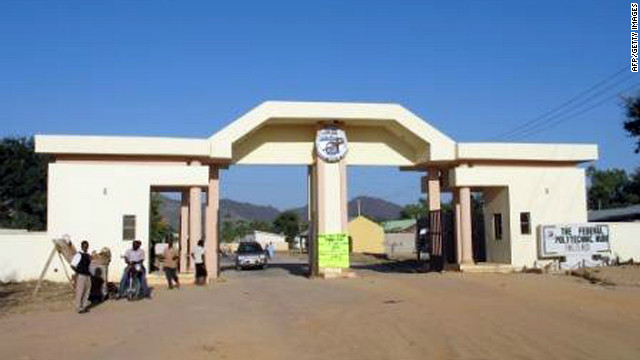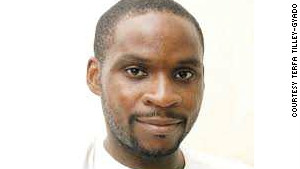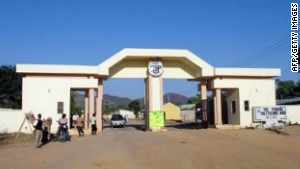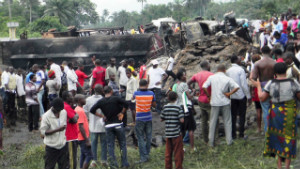October 5, 2012 -- Updated 1002 GMT (1802 HKT)

Dozens of people were killed in shooting at Federal Polytechnic Mubi campus in Nigeria on October 1.
STORY HIGHLIGHTS
- Political commentator says Nigerians largely indifferent to growing security threat
- Twenty-five students were executed at a university in Mubi, Adamawa state Monday
- Tilley-Gyado argues insecurity has now become a constant companion for many Nigerians
Editor's note:
Tilley-Gyado is a Nigerian journalist and commentator. He is a former
bureau chief and editor of the newspaper, 234Next. His works have been
featured in Huffington Post, Daily Telegraph and several Nigerian
newspapers. He has also worked as a political analyst for AlJazeera.
Follow him on Twitter: @TerfaTG
Abuja, Nigeria (CNN) -- In Nigeria, nobody speaks of
terrible things. Where some unimaginable atrocity has been committed
the news is often met with pursed lips, a double snap of the fingers and
a swift motion over ones head to invoke a purge against evil. To speak
of terror is to welcome it into one's life.
A terrible thing happened
in Nigeria on Independence Day. In the small town of Mubi in the
North-east, 25 students were rounded up a few hours before midnight.
Their names were called out one by one.

Terfa Tilley-Gyado
This was no typical roll call, however. The owner of each name that was called was swiftly executed by unidentified gunmen.
No group has yet claimed responsibility. However Mubi is situated in
Adamawa state which has become volatile of recent, an unwilling hotbed
for the radical group, Boko Haram.
The cold blooded massacre
is one of the worst to hit an educational institution in Nigeria and
yet nobody is really talking about it. It is not a hot topic at the
workplace or on the streets. The public mood is palpably apathetic. Two
full days later and the news is only just filtering through to many.
Even where there is a
flicker of interest, pursed lips, double finger click, arms raised. Next
topic. Thank you very much. The federal government has responded
typically which is to say that the old book of cliches has been dusted
down for frantic recital.
No stone unturned.
Perpetrators brought to book. Remote and immediate causes will be
investigated. The cliches are often peppered with words like probe and
investigative and panel.
There is something sacred
about learning institutions. When one thinks of the more infamous
attacks on educational institutions -- Dunblane, Columbine, Toulouse,
Erfurt -- it is shocking to see there is not a similar outpouring of
grief in Nigeria over those who died in Monday's attack.
The sad truth is that
insecurity has now become a constant companion for many Nigerians. As a
result there is no longer any shock value. Attacks segue seamlessly into
more attacks at a pace that makes it impossible to distinguish, digest
or mourn appropriately.

Dozens massacred at a Nigerian school

Nigerian navy deploys to fight piracy

Dozens killed in fuel tanker explosion
Disbelief has made way
for indifference as no one simply knows how to respond anymore. One week
a church is hit, another a mosque. Today a newspaper headquarters is
bombed tomorrow a petrol station is set ablaze. The pattern of violence
is predictably indiscriminate.
The strategy to combat
the rising insecurity -- if indeed there is a strategy -- is not a
winning one. Eyewitnesses to the Mubi killings say the shooting lasted
for almost two hours uninterrupted after which the killers casually
disappeared into the night.
The latest attack will
once again question the imperative of a regional or state police force.
The national police system is crumbling under the weight of increased
responsibility. The argument, which is slowly gaining traction, is that a
local police force would have a far greater appreciation of the
terrain, natives and nuances of a particular place.
The current practice of stationing police officers in completely unfamiliar surroundings puts them at an obvious disadvantage.
However even if a state
police system becomes a reality, the long term solution to tackling
insecurity must go beyond fighting fire with fire. There are more
fundamental issues at play.
The disparity that
exists between Nigerians is greater now than it has ever been. There are
no new interconnecting roads and bridges to reconnect cities and
states. Strangers remain strangers. It will always be easier to maim or
kill those that are unfamiliar to you.
A greater push must be
made to plan and budget public spending that will be used to finance the
ever deepening infrastructure deficit.
Where idleness exists
crime and violence invariably follow. The inordinate amount of
unemployed Nigerians can be linked directly to rising insecurity levels.
There is insufficient power to energize the productive energy of the
economy.
Cosmetic initiatives
such as the almajiri school system, which combines Muslim and western
education, are rubric failures. People have to eat before they can
learn. An empty stomach is the poorest of receptacles for qualitative
learning.
A better initiative
would be to establish commodity boards to buy produce at government
guaranteed prices. This puts money in the hands of the poor rural
farmers who are most vulnerable yet paradoxically have the
responsibility of feeding a country. The human potential of a satiated
nation is close to infinite. A full belly is the most effective
distraction against crime.
Until such measures are
put in place the Nigerian society will need to rediscover the ability to
police itself. The growing number of atrocities is being perpetrated by
people indigenous to the area.
Rising insurgency has
led to rising insularity. Neighbors are now regarded with suspicion. It
is a harsh truth to bear. There are killers in the midst of everyday
Nigerians. Only a greater acceptance of civic duties; to observe and
report suspicious behavior can expose those that lurk in the shadows yet
continue to wreak havoc across the land.
The opinions expressed in this commentary are solely those of Terfa Tilley-Gyado.

No comments:
Post a Comment